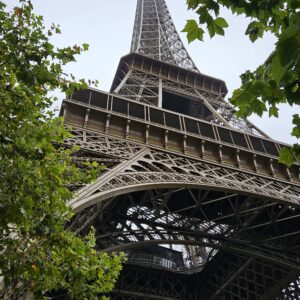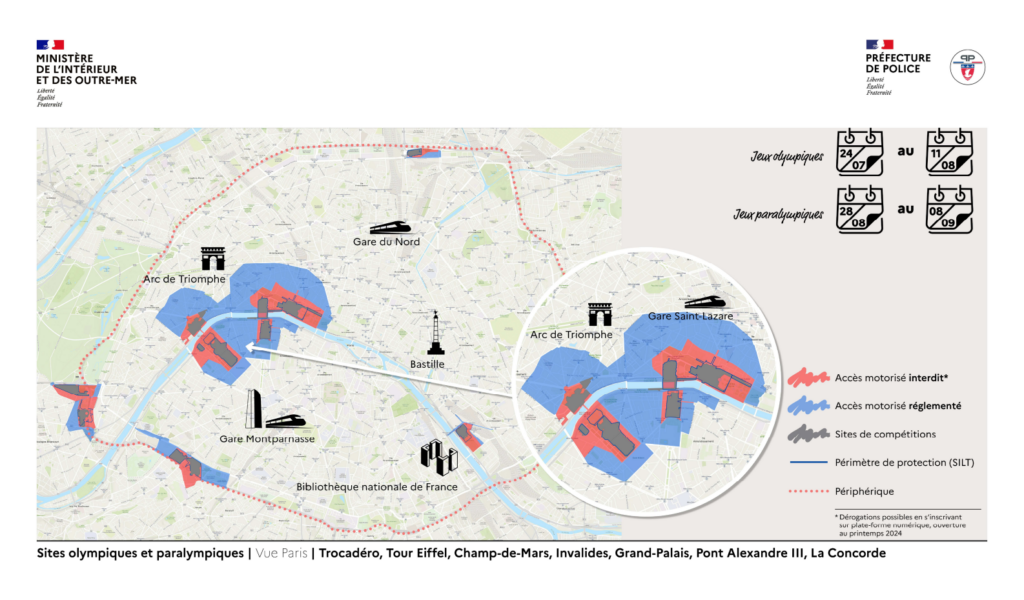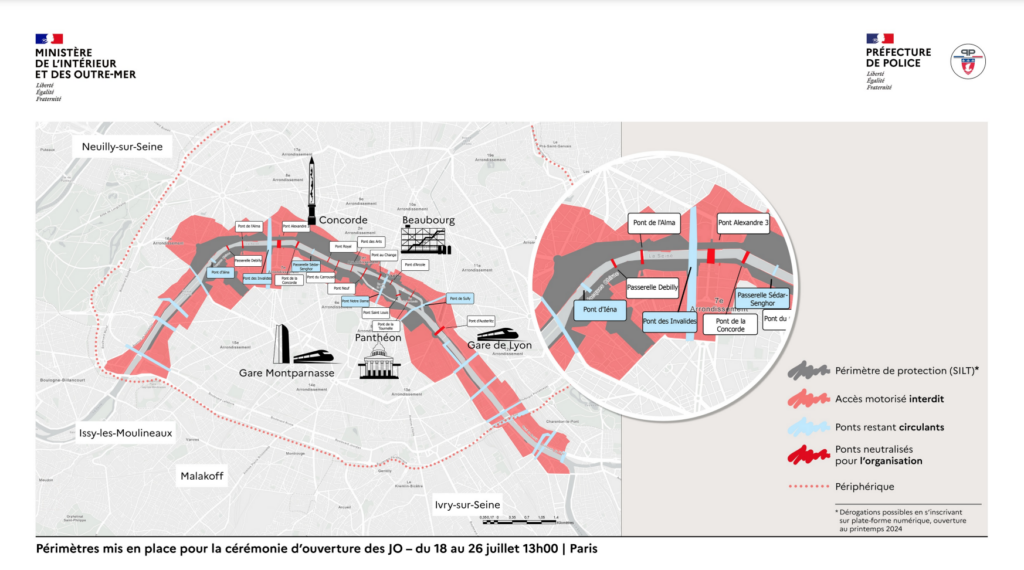Everything you need to know about Paris and the Olympics 2024
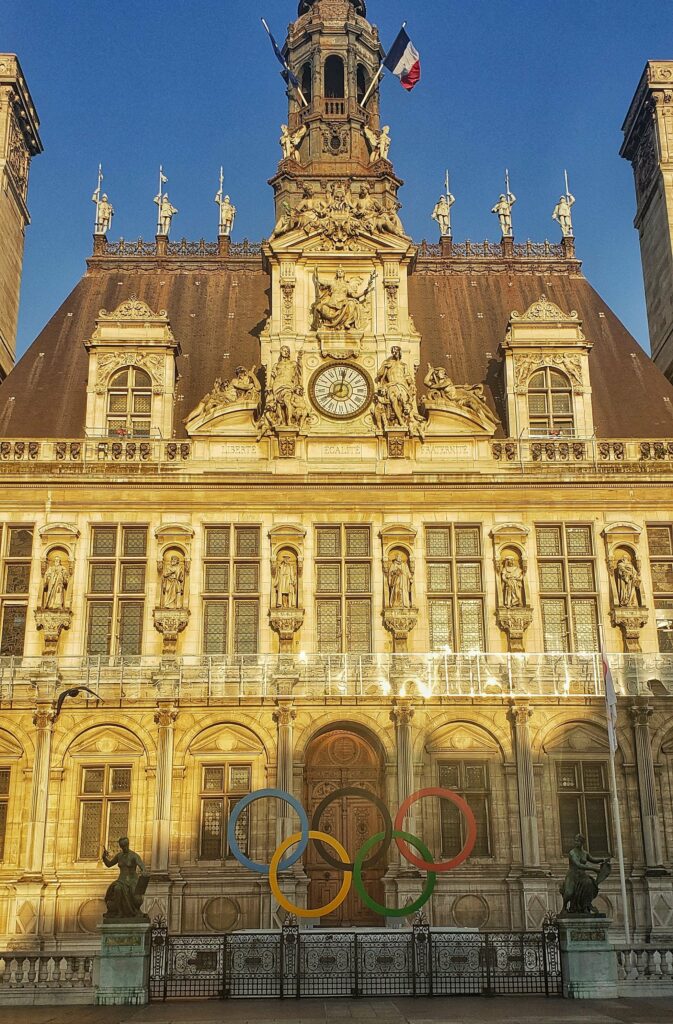
Summer 2024 in Paris will be like no other.
The Olympics will be making their debut (for a second time) in the city of Lights from July 26th to August 11th 2024 and the Paralympics from August 28th to September 8th 2024. The city has been in transformation (i.e. orange cone city) since 2021.
There are an estimated 15 million people that will descend upon the city during this timeframe for the 2024 summer season. For reference, a typical Parisian summer sees around 6.3 million people from all over the world. The city has been in preparation for the abnormal influx of tourists that are coming for the games since the end of Covid. There’s been a lot of the city that has been barricaded, behind scaffolding, walking paths changes, orange cones and so much more.
Paris is most definitely not what she used to be and if you’re planning on coming to visit from June to, let’s say, November, there are going to be some changes you’ll need to take into consideration. Have no fear, I’ve gone and done all the research for you so you don’t have to stress about it. I want you to get the most out of your time in Paris even though there are some major changes/events going. You’ll need to be patient and plan in advance.
Table of Contents
General information to get you started
Security Zones
Paris is going to be a bevy of dos and don’ts during this time period and more specifically the closer you get to the competition sites. If you are here and are wanting to spend some time being a flâneur throughout the city, there are some areas where you’ll need to be aware that may be off limits.
Certain places around the Seine and other Olympic site will have a security perimeter in place and you may not be able to approach The security zones moving from the competition site out are divided into 4 different zones, Grey, Black, Red and Blue. These have different levels of security and require different levels of access. Here’s a breakdown of those 4 zones:
Grey Zone
This perimeter is live from the start of the site construction to dismantling of it. This perimeter is purposefully kept very small (as close as possible to the sites) to limit the impact on local residents surrounding the area. Access to these areas is strictly regulated: only people and vehicles authorized and accredited by the Paris 2024 organization, or in possession of tickets during the events, will be allowed access to the sites.
Black Zone (the SILT zone)
The SILT Zone, or best described as the Strengthening Internal Security and the Fight Against Terrorism Zone is a protective perimeter around designated areas (competition venues) to secure it by allowing access only to spectators with tickets and people accredited by Paris 2024. This will be in place during the competitions in those areas.
Red Zone
This means that there is no motorized traffic allowed to circulate from 2.5 hours before the start of a competition to 1 hour after the competition ends. Pedestrians and cyclists are allowed to circulate without any restrictions. This is the area that is around the competition site.
Blue Zone
This area is the area outside of the red zone. It regulates motorized road traffic and allows the reduction and detour of motorized traffic surrounding the red zone. Verification checks may be carried out at crossing points by the police. Please note, you will not need a QR code like you will for the Red Zone.
You can find the full list (in French) of people/vehicles that are allowed to circulate during the Olympics and Paraolympics games here.
Opening Ceremony – July 26, 2024
The security zones for the opening ceremony will be open and reinforced starting 8 days before the 26th, meaning from Thursday July 18, 2024 till the 26th.
Grey Zone (SILT)
Pedestrians and cyclists can access this area as long they are able to present a digital pass, a ticket or a permit allowing them to enter the ceremony. Vehicle access in this area is strictly prohibited, unless presented with a digital pass. On the 26th, the day of the ceremony, absolutely no vehicles will be allowed through from 1 PM on.
Red Zone (Motorized traffic)
Restrictions on motor vehicle traffic will be in effect from 8 days (July 18, 2024) before the opening ceremony on July 26, 2024. Vehicle traffic will be strictly prohibited except with specific exceptions, which include proof of evidence. In general, only special forces or emergency vehicles will be allowed through to the zone.
For those of you that have gotten this far and live in the Paris and IDF region, you may want to visit the website Anticiper les Jeux. This website is set up by the government that is to help those who live here stay informed on updates.
QR Code : Laissez-passer or Passe Jeux
There are certain areas in and around Paris Olympic games sites that you will need a QR code in order to enter them. There is some confusion as to what and when this QR code is needed for. From July 26th to August 11th and from August 28th to September 8th, the red zone will be off limits to motorized vehicles. Pedestrians and cyclists will be allowed in the red zone. The security zones for the opening ceremony go into effect on July 18th through July 26th and these are mostly around the Seine and the quais. Think you need a pass? You can apply online here.
Areas concerned
Pedestrians and cyclists can access this area as long they are able to present a digital pass, a ticket or a permit allowing them to enter the ceremony. Vehicle access in this area is strictly prohibited, unless presented with a digital pass. On the 26th, the day of the ceremony, absolutely no vehicles will be allowed through from 1 PM on. If you have a ticket for the opening ceremony, you do not need a QR code as your ticket is your proof to have access.
Red Zone (Motorized traffic)
Restrictions on motor vehicle traffic will be in effect from 8 days (July 18, 2024) before the opening ceremony on July 26, 2024. Vehicle traffic will be strictly prohibited except with specific exceptions, which include proof of evidence. In general, only special forces or emergency vehicles will be allowed through to the zone. Red zones are activated 2.5 hours before the first competition and last fro one hour after a competition event ends.
Grey Zone
In effect from July 18 to July 26 at 1 PM. A QR code will required for all pedestrians, cyclists, and motor vehicles wishing to access this zone. From July 26 at 1 PM, the QR code will also be required for all residents of the grey zones. Vehicles will be strictly prohibited (with exception of emergency vehicles).
You can check to see if your address is either the red or the grey zone here.
Closures
One thing that you’ll need to be keenly aware of when you are here during the before and after of the Olympics is public transportation disruptions, closures, and possibly last-minute issues. Your best bet to stay on top of any sort of disruption in regards to public transportation will be phone applications. You’ll first need to make sure that you’ve taken all the steps necessary to make sure that your phone will not rack up massive data charges (you do not want that surprise on your next monthly phone bill).
You can read my article of essential phone apps for Paris (whether visiting or living here) below.
Here’s what we know about the closures as of today. I’ll be back to update this as frequently as humanly possible, we are talking about the city of Paris specifically, I will not be sharing information on other cities in France that are also playing host to sporting events during the Olympics.
The following metro stations will be closed during their respective dates:
Ⓜ️ Line 1: Champs-Elysées – Clémenceau – July 1 to September 21, 2024. Concorde and Tuileries – June 17 to September 21, 2024.
Ⓜ️ Line 4: Cité – July 18 – 27, 2024.
Ⓜ️ Line 5: Quai de la Rapée – July 18 – 27,2024.
Ⓜ️ Line 6: Trocadéro, Passy – July 18 – 27, 2024.
Ⓜ️ Line 7: Châtelet, Pont Marie, Pont Neuf, Sully-Morland – July 18 – 27, 2024.
Ⓜ️ Line 8: Concorde – June 17 to September 21, 2024.
Ⓜ️ Line 9: Alma-Marceau, Trocadéro, Iéna – July 18 – 27, 2024.
Ⓜ️ Line 10: Javel – July 18 – 27, 2024.
Ⓜ️ Line 12: Concorde – May 17 to September 22, 2024, access to Concorde and Tuileries – June 17 to September 21, 2024.
Ⓜ️ Line 13: Champs-Elysées – Clémenceau – July 1 to September 21, 2024.
🚇RER C: Musée d’Orsay, Champ de Mars Tour Eiffel, Pont de l’Alma – July 18 – 27, 2024.
🚇 Tram T2: Porte d’Issy and Porte de Versailles from July 25 to August 11 and August 29 to Sptember 7. There will be no traffic between Suzanne Lenglen and Porte de Versailled from July 25 to August 11 and August 29 to Sptember 7.
🚇 Tram T3a: Porte de Versailles from July 25 to August 11 and August 29 to Sptember 7.
🚇 Tram T3b: Colette Besson from July 27 to August 10 and from August 29 to September 8.
Here are the following locations through out Paris that will be closed due to preparations for the opening ceremony as well as being venues that will host competitions:
🚫 Place de la Concorde – June 1 (reopening between August 29 and October 30)
🚫 Champs de Mars – June 3 ( reopening between September 19 and November 4)
🚫 Pont d’Iéna – July 1
🚫 Quai Jacques Chirac – July 24
🚫 Trocadéro Garden- July 1 ( reopening July 27 and October 8)
🚫 Trocadéro Place – July 16 ( reopening July 27 and October 8)
🚫 Rue Saint Dominique (between avenue Gallieni and rue Constantine and between rues Faber and Constantine) – April 12 (reopening between September 18 and October 30)
🚫 Avenue Gallieni – May 17 (reopening between September 18 and October 30)
🚫 Rue de l’Université (between rue Faber and Constantine) – June 17 (reopening between September 18 and October 30)
🚫 Cours La-Rein (between pont des Invalides and Pont Alexandre III) – April 26 (reopening September 12 and October 26)
🚫 Port des Champs Elysées – May 20 (reopening September 12 and October 26)
🚫 Port des Invalides – June 3 to June 10
Just as a reminder, because I am sure it has been put to the wayside, Paris is home to the 2024 Summer Olympics and Paralympics. I am guessing that Paris will be packed for the Olympics and there will be less spectators for the Paralympics. These closures will cover both athletic events and some time after to allow for all installations to be taken down around event sites.
Price Increases
Something inevitable that was bound to happen was a price increase for certain things. The biggest change is to the price of the tickets for public transportation (metro, bus, tram, train, RER). If you are used to visiting Paris and getting around thanks to the public transportation system, you’ll be surprised to see what they’ll be during the Olympics.
There are several different options for tickets when coming to Paris for the Olympics. If i can suggest one thing, it will to be either to put your tickets/pass on your phone or on a card. Do not bother getting the cardboard tickets, they are being phased out and will cause you a potential headache.
The Eiffel Tower ticket prices will be changing from June 17, 2024 and on. The price will go from €29.40 to €35.30 for one adult ticket to the top of the Eiffel Tower. Elevator tickets for an adult to the 2nd floor will go from 18.80€ to 22.60€ and the tickets for the staircase will go from 11.80€ to 14.20€.
The Louvre tickets have already gone up in price in January 2024, the general ticket will go up from 17€ to 22€.
Do your research first before if you are planning any activities in Paris while you’re here during the Olympics. So far on the publication of this article, there are no other museums that have increased their ticket prices.
Ticket Options during the Olympics
You have several different options to purchase your tickets while in Paris.
Paris 2024 Pass
- For use starting from July 20, 2024 to September 8, 2024.
- Valid from 1 day to 7 and 14 days.
- Unlimited travel from the moment you use it for the first time.
- Valid for zones 1 through 5.
- Can use to get from Roissy-Charles de Gaulle and Orly airports.
- Order your card online here. Can be ordered to be delivered to your home.
- The physical pass itself costs 2€ (plus the cost of your tickets).
- The pass can also be bought on your phone (through the Île-de-France Mobilités or Paris 2024 Public Transportation apps).
Individual Ticket T+
- Can be purchased on the Navigo Easy card or the IDF Mobilités app on your phone.
- Individual tickets will cost 4€ per ticket or 32€ for a packet of 10 tickets.
- Valid on the Metro and RER in central Paris.
- Can load tickets at either a ticket window or through the IDF Mobilités app on your phone.
Other option updates coming soon.
Public Transportation Tips
Here’s what we know about the public transportation during the Olympics :
The lines that will most be affected are the following:
- Metro: lines 5,6 7,8,9,10,12,13 and 14
- Tramway: T3a and T3b
- RER: B, C, D
- Transilien: lines J (direction Ermont Eaubonne), L (direction Versailles Rive Droite), N, P (direction Meaux), U.
- Do not have information on the bus lines yet. Will update when necessary.
Please keep in mind that these lines and means of transportation leading up to and during the Olympics and Paralympics will most likely be saturated with people. Not only will the users be those here for the Olympic and Paralympic events but also those that live and work here. Please allow for ample time (and possible delays) when using public transportation in Paris.
Navigating the Paris Metro
The Paris 2024 Public Transportation app is your best bet when getting around the city, to and from events, during the Olympics and Paralympics. This application combines all the information you will need to be mobile during your time in Paris. It has everything from information on where yu can purchases transportation tickets, reload your passes, bus stops, Velib’ stations, metro and RER stations as well as information on each Olympic site.
Here’s a peek at what’s available in the app:

You May Also Like
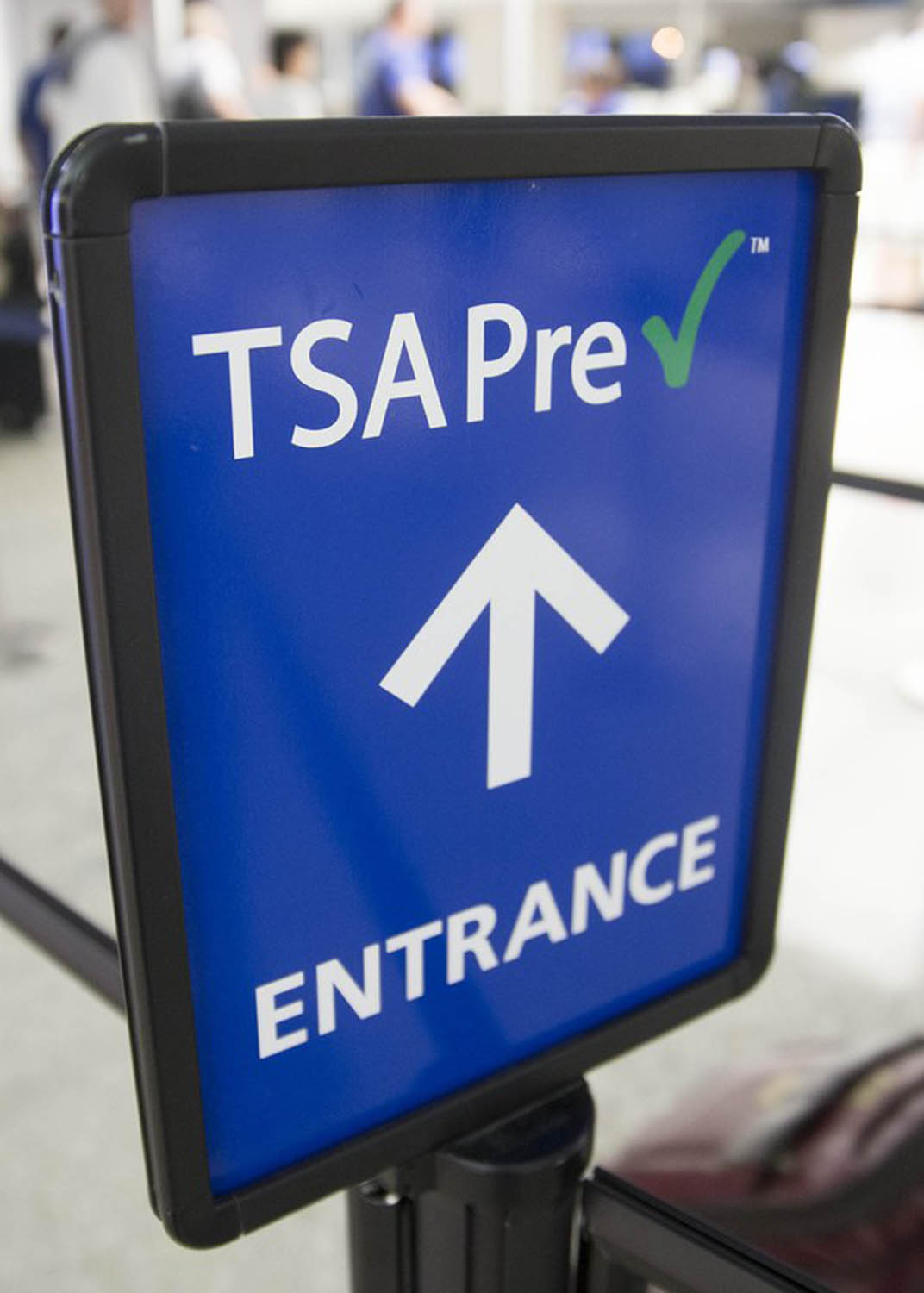
Are you a Trusted Traveler?
10 January 2020
Five Things I’ve learned since moving to France as an American Expat.
27 October 2020